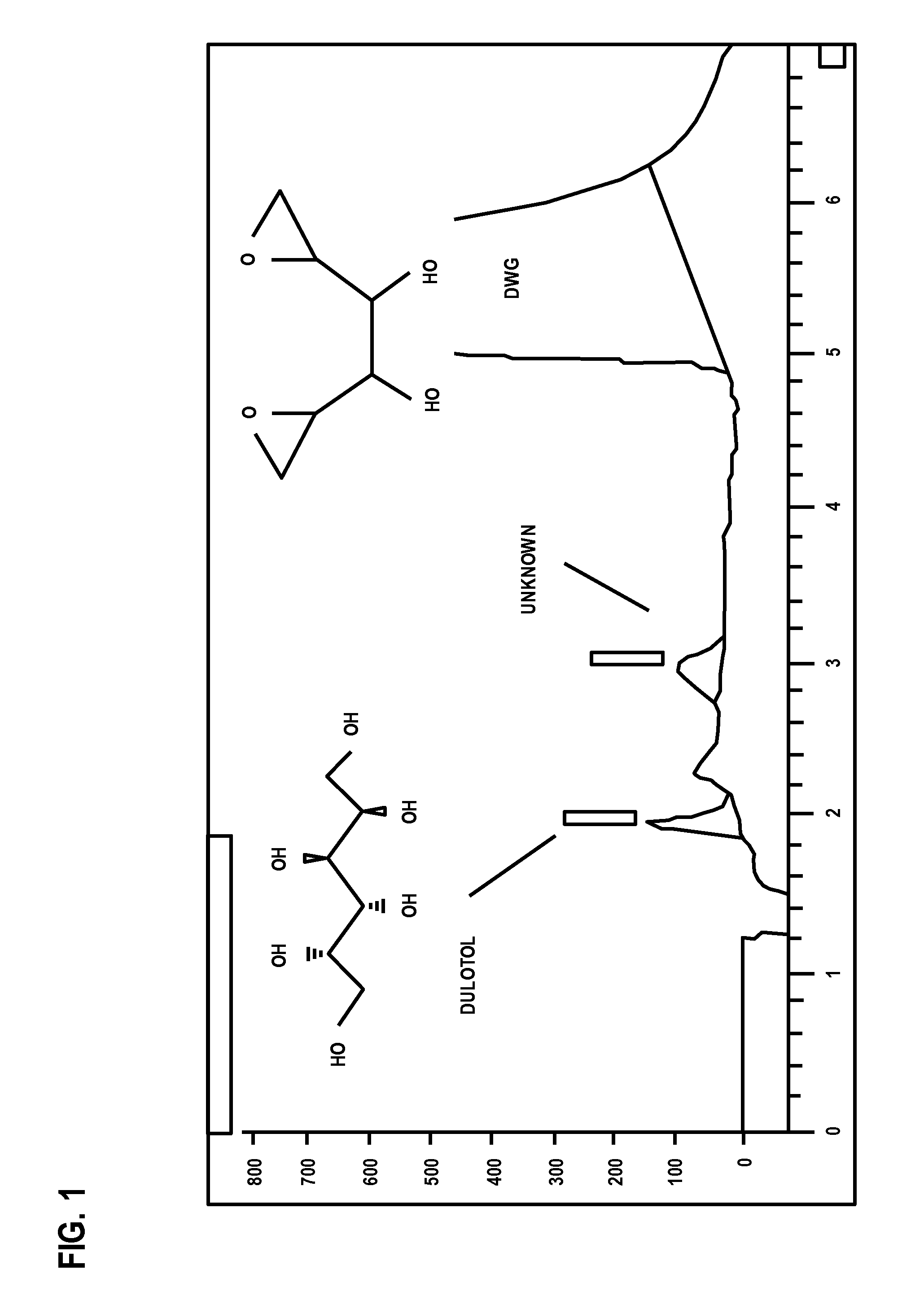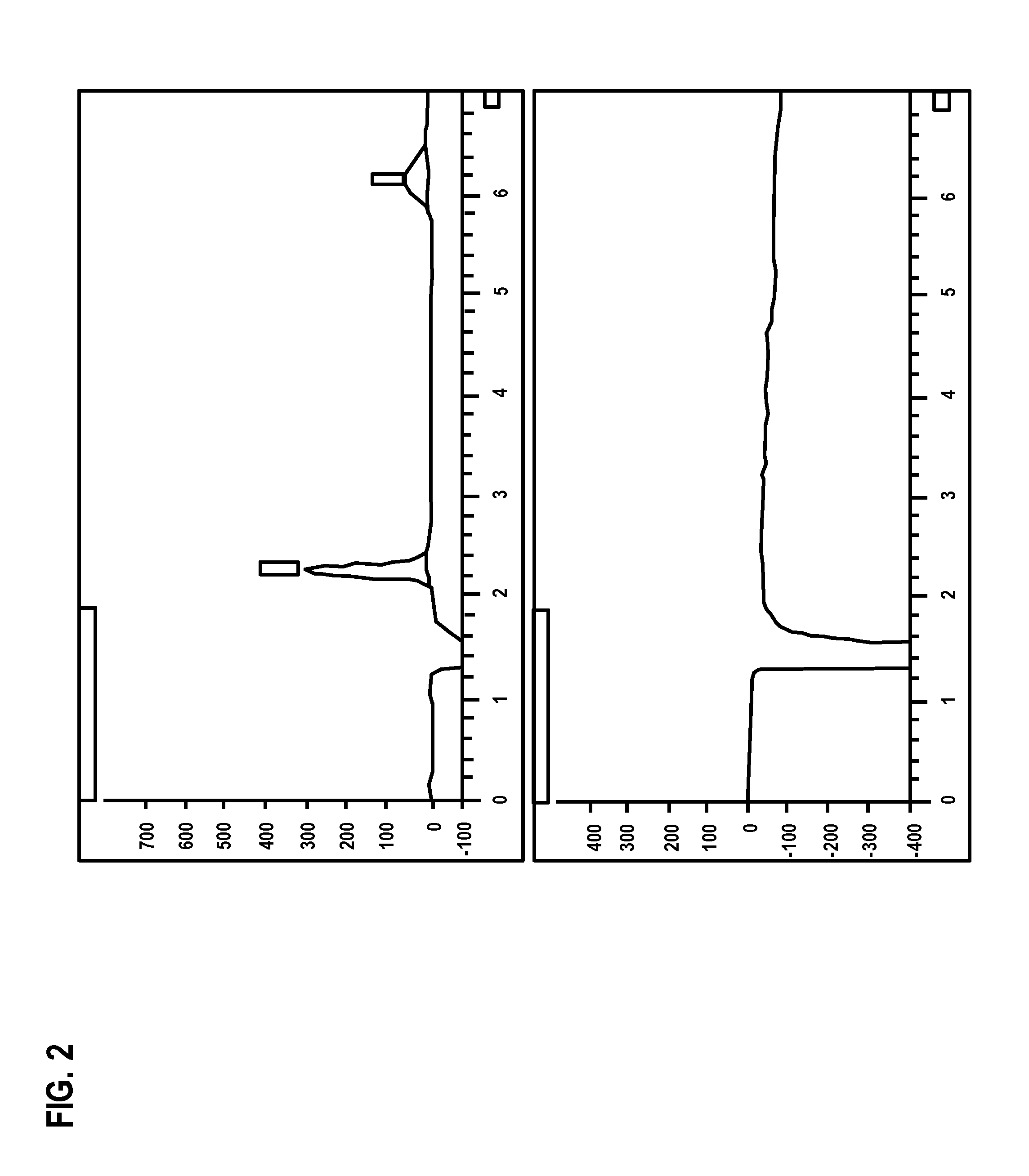Analytical methods for analyzing and determining impurities in dianhydrogalactitol
a technology of dianhydrogalactitol and analytical methods, which is applied in the field of analytical methods for dianhydrogalactitol, can solve the problems of unsatisfactory side effects and the increased incidence of undesirable side effects of patients
- Summary
- Abstract
- Description
- Claims
- Application Information
AI Technical Summary
Benefits of technology
Problems solved by technology
Method used
Image
Examples
example 1
HPLC Analysis of Dianhydrogalactitol Preparations Employing Isocratic Sodium Hydroxide Elution
[0079]The procedure described in this Example is used for determining dulcitol and related impurities in a dianhydrogalactitol drug preparation by ion exchange high performance liquid chromatography with refractive index detection.
[0080]In this procedure, the samples are prepared with dianhydrogalactitol at a target concentration of 5 mg / mL. Dulcitol, dianhydrogalactitol, and related impurities are separated using an anion exchange column (Hamilton RCX-10, 250×4.1 mm, 7 μm), with 50 mM NaOH as isocratic mobile phase with refractive index detection. Dulcitol concentration is determined with an external reference standard and the contents of related substances are estimated using a DAG reference standard.
[0081]A suitable HPLC system and data acquisition system is an Agilent Technologies 1200 Series HPLC system or equivalent equipped with the following: Quat pump, Model G1311A or equivalent; a...
example 2
HPLC Analysis Employing Evaporative Light Scattering Detector Using Gradient of Water / Acetonitrile
[0098]To improve resolution of impurities, another method of HPLC analysis was employed using an evaporative light scattering detector (ELSD) with a gradient of water / acetonitrile as detailed below.
[0099]Due to the limitations of the refractive index (RI) detector, the HPLC / RI method does not have sufficient specificity to obtain reliable impurity profile data, which pose the risks of exposure of patients to unacceptable levels of impurities that are unknown or are incompletely characterized. To address this concern, a more sensitive detector, such as the evaporative light scattering detector (ELSD) manufactured by Agilent, is used in conjunction with HPLC system for determination of impurities found in dianhydrogalactitol drug substance or drug product.
[0100]For example, a DAG sample was analyzed by HPLC / ELSD method using a YMC C18 column with the gradient shown in Table 3:
TABLE 3Time ...
example 3
[0102]HPLC Analysis with Formic Acid in Water / Methanol Gradient to Improve Resolution of Mono-Epoxide Peaks
[0103]To improve the resolution of mono-epoxide peaks, a new method was developed. This new method employed the following parameters: The column was Atlantis C18, 250×4.6 mm, 5 μm. The column temperature was 30° C. The flow rate was 0.5 mL / min. The injection volume was 100 μL. The ELSD detector was operated in cooling mode with the drift tube temperature of 35° C. and gain 400, 2 pps, 45 PSI. Mobile Phase A was 0.05% formic acid in water. Mobile Phase B was 100% methanol. The gradient was shown in Table 5:
TABLE 5Time, min% A% B0100025901025.1-35109035.1-501000
[0104]Better resolution of the early eluting impurities has been observed (refer to chromatogram of DAG sample below in FIG. 5). Dulcitol labeled peak 2 was eluted at retention time of 6.26 minutes or relative retention time (RRT) of 0.59. Dianhydrogalactitol was eluted at 10.86 minutes.
[0105]Since ELSD response is not lin...
PUM
 Login to View More
Login to View More Abstract
Description
Claims
Application Information
 Login to View More
Login to View More - R&D
- Intellectual Property
- Life Sciences
- Materials
- Tech Scout
- Unparalleled Data Quality
- Higher Quality Content
- 60% Fewer Hallucinations
Browse by: Latest US Patents, China's latest patents, Technical Efficacy Thesaurus, Application Domain, Technology Topic, Popular Technical Reports.
© 2025 PatSnap. All rights reserved.Legal|Privacy policy|Modern Slavery Act Transparency Statement|Sitemap|About US| Contact US: help@patsnap.com



